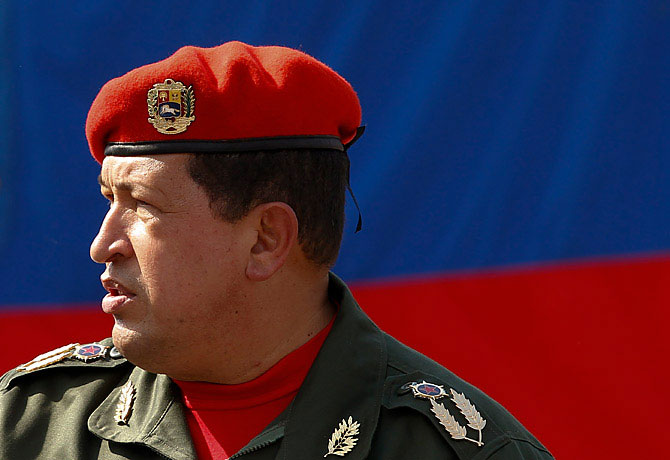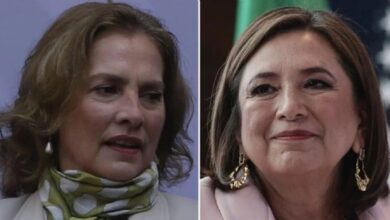Chavez Pushes Through Law to Rule by Decree
 At Christmas, most Venezuelans put politics aside to occupy themselves with whiskey-laden celebrations, heart-stopping firecrackers and visits to far-flung relatives. So few were surprised when President Hugo Chávez chose that annual party time to push through a law that allows him to rule by decree for 18 months, effectively superseding the new, less friendly National Assembly poised to take office on Jan. 5. Most Venezuelans were just too busy enjoying themselves to object — for the moment.
At Christmas, most Venezuelans put politics aside to occupy themselves with whiskey-laden celebrations, heart-stopping firecrackers and visits to far-flung relatives. So few were surprised when President Hugo Chávez chose that annual party time to push through a law that allows him to rule by decree for 18 months, effectively superseding the new, less friendly National Assembly poised to take office on Jan. 5. Most Venezuelans were just too busy enjoying themselves to object — for the moment.
For good measure or bad, the President’s supporters have also rushed through a stack of last-minute laws that regulate the Internet, prohibit nongovernmental organizations from receiving foreign funding, prevent lawmakers from voting against their political party and make it easier for the government to intervene in banks.
Chávez says the decree powers are necessary to assist the victims of heavy rains that have provoked flooding and mudslides, killing more than 30 and leaving some 130,000 homeless. Those displaced have been temporarily sheltered in hotels, a shopping mall Chávez expropriated last year and even the presidential palace. After visiting those affected on Christmas Eve, Chávez made his first use of the powers on Sunday to create a $2.3 billion fund for reconstruction efforts. He scoffed at critics who allege he will use his decree powers to slide the country toward dictatorship, saying, “There will be democracy, democracy and more democracy.”
Still, as he signed the so-called Enabling Law on Dec. 17, Chávez threw a gibe at opposition lawmakers who gained 67 of the National Assembly’s 165 seats in September — a minority, but still a dramatic shift from the rubber-stamp legislature he has enjoyed for the past five years. “Let’s see how they’re going to make their laws now,” Chávez crowed.
It’s not the first time Chávez has taken steps to challenge those who oppose him. After an opposition leader was elected mayor of Caracas last year, the National Assembly passed a law largely removing his power and creating a position above him for an official appointed directly by the President. While Chávez has vehemently denied accusations of foul play, critics have also accused his government of using politically charged corruption probes to disable his opponents and laws to limit the power of opposition governors. “It’s the way he’s acted in the past when he’s suffered a setback,” says Michael Shifter, president of the Washington-based think tank Inter-American Dialogue. “Chávez obviously doesn’t like to be challenged politically.”
Whether or not Chávez decides to use his newfound authority to limit dissent in the lead-up to the 2012 presidential elections, he has now been given the option. Steve Ellner, a political-science professor at the Universidad de Oriente and author of Rethinking Venezuelan Politics: Class, Conflict, and the Chávez Phenomenon, says Chávez is moving ahead with his political program regardless of a recently strengthened opposition. “Chávez doesn’t slow down, he doesn’t take backward steps,” Ellner says. “The guiding principle of the Chavistas in power is, Democracy is about majority rule. And so whoever’s in power doesn’t have to make concessions.”
It’s the fourth time Chávez has held such powers during his nearly 12 years in office; in the past, he has used them to implement land reform and nationalize sectors of the oil industry. Such decree powers are not unusual for Venezuelan Presidents, and supporters like Victor Gómez see them as necessary to strengthen Chávez’s move away from privatization and toward a socialist economy. “The opposition doesn’t like it because they lived so long with benefits for a very few,” says Gómez, 57, a retail salesman. But “we’re all human, we have the right to equality.”
It’s not yet clear how the new laws will be applied. But watchdog groups including New York City–based Human Rights Watch have expressed concern over vague language in a telecommunications law that allows the government to punish broadcast or Internet-based media that “incites or promotes hatred” or advocates war. Broadcast regulators have already opened a handful of investigations into Globovisión, a virulently anti-Chávez TV channel the President has personally threatened with closure, and such rules could make it easier for his government to pull its broadcast license. Even if they are not used to impose sanctions, the rules could promote an atmosphere of self-censorship.
Opposition lawmakers have called the laws a coup d’état. In a joint statement issued last week, the main opposition coalition called on Venezuelans to protest peacefully in the streets — and despite the holiday festivities, some have heeded their call. Hundreds of students gathered outside the Central University of Venezuela on Thursday, shouting “Hey, students!” in protest of a university law they fear will be used to promote government ideology in schools. Riot police dispersed them with plastic bullets and a water cannon, saying the protest was unauthorized. The government has said the new law will make universities more democratic.
[adrotate group=”8″]
